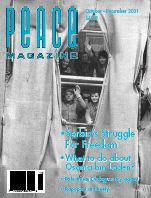
Peace Magazine Oct-Dec 2001, page 29. Some rights reserved.
Search for other articles by Ron Shirtliff here
Edited by Erika Simpson McGill-Queen's University Press, 2001
Nato and the Bomb is a review of Canada's relations with Nato and the US from 1957 to 1989. A scholarly book with 219 pages of notes, bibliography, and index to support 230 pages of text, it details the Cold War debates, victories and defeats of Canadian "hawks" and "doves" in high places (No such emotive language ever darkens its pages.). It unfolds what is known of the debate thoroughly but ever so cautiously, rarely straying, even with the advantage of hindsight, from the strict neutrality of language that defines the protagonists only as "defenders" and "critics." Judgments are not encouraged. Dull, but probably a valuable resource book, it uses recently declassified documents and numerous, off-the-record interviews. This is not a book to recapture the fire in the belly of those of us who feared the precipitation of Armageddon by ideological zealots, nor the paranoid passions of the zealots themselves. Yet I choose to read it as a kind of backhanded compliment to the "Canadian condition," struggling to be, or not to be, a passive pawn in the great conflict of the Twentieth Century. Canada, waffling its way through the Cold War, was about as honorable as it could be in the circumstances. Indecision pervaded our society from the grassroots to the Prime Ministers. In six years, 1957 to 1963, Diefenbaker moved from being a cold warrior to a leader who sought to maintain some Canadian control over the use of our territory and weapons in the face of US domination. In the same years Pearson and his party flipped from anti- to pro- nuclear participation (and won an election) and then started to question our troop commitments in Europe. Trudeau, after leading us out of a nuclear role, pursued more actively the idea that Canada, rather than being a gung-ho private in a mad army, should lead in seeking ways to reduce threats and insecurity, find paths to peace. In reality, Canada could play only a minor role in the tectonic plate politics of the era. Still its hesitations and feet dragging represented the feeling of Canadians better than, say, the official policies of the UK, which essentially ignored its massive CND peace movement. We are fortunate that we survived those dangerous years. Other scholars may use the material of this study to try to determine whether our internal debate had any impact on the overall outcome of the Cold War, or whether it was just a case of our own democracy in action.
Reviewed by Ron Shirtliff, an editor of Peace Magazine.

Peace Magazine Oct-Dec 2001, page 29. Some rights reserved.
Search for other articles by Ron Shirtliff here